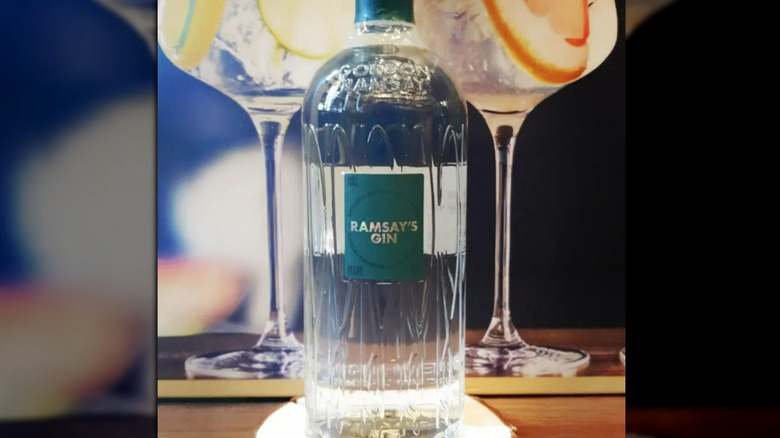The Real Reason Gordon Ramsay's Gin Ad Was Banned
Celebrity slash booze-related partnerships have come of age, per Linked In's Pulse publication. Lucrative for many (via Today), that's not to say there aren't risks (via The National Law Review). But not everyone is equally risk averse, with a notable few being so definitively risk-friendly that they'd be willing to, say, take on risky restaurant ventures on a weekly basis during all seven seasons of Fox's "Kitchen Nightmares." But, of course, we're talking about celebrity chef and television and media personality, Gordon Ramsay (who, make no mistake, accepts no risk whatsoever when it comes to avoiding this steak defrosting mistake). As you might have guessed, Ramsay is one of those celebrities whose name is associated with a brand of wine or spirit, per Just Drinks.
Last year, Gordon Ramsay partnered with a Scottish craft distillery company, Eden Mill, located on the banks of the Eden Estuary near St. Andrews University (which may sound familiar because it's where the Prince and Princess of Wales first became acquainted). The result was a signature gin known as Ramsay's Gin (since it couldn't have very well been called Gordon's Gin). Launched in late July 2021, it was, at some point, advertised via social media run by Eden Mill as featuring an ingredient called "honeyberry," which the ad copy went on to claim contained "more antioxidants than blueberries, more potassium than bananas, [and] more vitamin C than oranges," per The Spirits Business. Here's why it got banned by the U.K.'s Advertising Standards Authority.
Was it something we said? -- makers of Ramsay's Gin
Gordon Ramsay's gin ads touting the brand's micronutrient content were banned by the U.K. entity that enforces advertising standards (via The Spirits Business). The reason has nothing to do with whether or not honeyberry is an actual thing (it is, by the way, per Better Homes & Gardens). Nor does it have to do with the veracity of claims that Eden Mills was admittedly making via Facebook and Instagram to the effect that drinking Ramsay's Gin, which is Eden Mills' Ramsay-branded gin, might actually be good for you. The brand was claiming it might even prevent cancer given they contain antioxidants, which may have a hand in preventing cancer when consumed in food, per Fox Chase Cancer Center.
Rather, the issue for the Advertising Standards Agency (ASA) was that the ads violated the U.K. advertising code. Specifically, they violated the prohibition on nutrition claims being made in alcohol beverage advertising (except in connection with beverages that are legally labeled as "low alcohol", "reduced alcohol" or "reduced energy," says The Guardian). The ASA decided that statements made via social media (discussed above) by Eden Mills and on behalf of Gordon Ramsay, could be construed by consumers as "nutritional claims" and therefore were regarded as such. Accordingly, the ads would have to be banned to comply with applicable law.
The Guardian reported that Eden Mills cooperated with the ban and gave a statement suggesting it realized it had erred.

